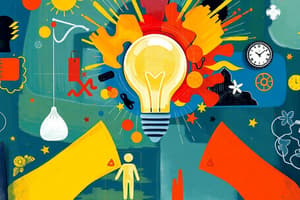Podcast
Questions and Answers
What happens to agency costs as a firm grows?
What happens to agency costs as a firm grows?
- They are eliminated
- They remain the same
- They decrease
- They increase (correct)
How does IT affect the number of managers needed in an organization?
How does IT affect the number of managers needed in an organization?
- It reduces the number of managers (correct)
- It has no effect on the number of managers
- It eliminates the need for managers
- It increases the number of managers
What is the basis of authority in postindustrial societies?
What is the basis of authority in postindustrial societies?
- Social status
- Knowledge and competence (correct)
- Age and experience
- Formal positions
What is the result of IT providing managers with information to supervise larger numbers of workers?
What is the result of IT providing managers with information to supervise larger numbers of workers?
What is the most common reason for failure of large projects?
What is the most common reason for failure of large projects?
What is the result of giving lower-level employees more decision-making authority?
What is the result of giving lower-level employees more decision-making authority?
What is the role of information systems in organizational politics?
What is the role of information systems in organizational politics?
What is the impact of IT on organizational structure?
What is the impact of IT on organizational structure?
What is the primary characteristic of first movers in the context of disruptive technologies?
What is the primary characteristic of first movers in the context of disruptive technologies?
What is the primary function of information systems technology in an organization?
What is the primary function of information systems technology in an organization?
Which type of organizational structure is typically associated with law firms and school systems?
Which type of organizational structure is typically associated with law firms and school systems?
What is the primary benefit of IT in reducing transaction costs?
What is the primary benefit of IT in reducing transaction costs?
What is the primary assumption of agency theory?
What is the primary assumption of agency theory?
What is the primary impact of IT on the cost and quality of information?
What is the primary impact of IT on the cost and quality of information?
What is the primary characteristic of an adhocracy?
What is the primary characteristic of an adhocracy?
What is the primary benefit of outsourcing in the context of transaction cost theory?
What is the primary benefit of outsourcing in the context of transaction cost theory?
What is the primary focus of the primary activities in the business value chain model?
What is the primary focus of the primary activities in the business value chain model?
What is the purpose of the inbound logistics primary activity?
What is the purpose of the inbound logistics primary activity?
Which of the following is an example of a support activity?
Which of the following is an example of a support activity?
What is the goal of benchmarking in the business value chain model?
What is the goal of benchmarking in the business value chain model?
What is the outcome of using the business value chain model?
What is the outcome of using the business value chain model?
What is the main goal of identifying industry best practices?
What is the main goal of identifying industry best practices?
What is the purpose of the service primary activity?
What is the purpose of the service primary activity?
What is the role of technology in the business value chain model?
What is the role of technology in the business value chain model?
What is the result of making improvements in a company's value chain?
What is the result of making improvements in a company's value chain?
What is the primary characteristic of a value web?
What is the primary characteristic of a value web?
What is the purpose of asking 'How can we use information systems to improve operational efficiency and improve customer and supplier intimacy?'?
What is the purpose of asking 'How can we use information systems to improve operational efficiency and improve customer and supplier intimacy?'?
What is the purpose of analyzing the value chain?
What is the purpose of analyzing the value chain?
How do companies benefit from software-enhanced cars?
How do companies benefit from software-enhanced cars?
What is the outcome if competitors also make improvements in their value chains?
What is the outcome if competitors also make improvements in their value chains?
What is a collection of independent firms using synchronized IT to coordinate value chains called?
What is a collection of independent firms using synchronized IT to coordinate value chains called?
What is the purpose of identifying candidate applications of information systems?
What is the purpose of identifying candidate applications of information systems?
What is a key aspect of implementing information systems in an organization?
What is a key aspect of implementing information systems in an organization?
How does the Internet affect organizations?
How does the Internet affect organizations?
What is an example of how the Internet can benefit a large firm?
What is an example of how the Internet can benefit a large firm?
What is an important factor to consider when planning a new information system?
What is an important factor to consider when planning a new information system?
What is the main idea behind Michael Porter's competitive forces model?
What is the main idea behind Michael Porter's competitive forces model?
What are the five competitive forces that shape the fate of a firm, according to Porter's model?
What are the five competitive forces that shape the fate of a firm, according to Porter's model?
What is a key aspect of achieving competitive advantage through information systems?
What is a key aspect of achieving competitive advantage through information systems?
What is a key consideration when designing a new information system?
What is a key consideration when designing a new information system?
Flashcards are hidden until you start studying
Study Notes
Disruptive Technologies
- Examples of technologies that bring about sweeping change to businesses, industries, and markets: personal computers, word processing software, the Internet, and the PageRank algorithm
- First movers: inventors of disruptive technologies
- Fast followers: firms with the size and resources to capitalize on that technology
Organizational Structure
- 5 basic kinds of organizational structure:
- Entrepreneurial: small start-up business
- Machine bureaucracy: midsize manufacturing firm
- Divisionalized bureaucracy: Fortune 500 firms
- Professional bureaucracy: law firms, school systems, hospitals
- Adhocracy: consulting firms
Economic Impact of IT
- IT changes relative costs of capital and the costs of information
- Information systems technology is a factor of production, like capital and labor
- IT affects the cost and quality of information and changes economics of information
- Information technology helps firms contract in size because it can reduce transaction costs (the cost of participating in markets)
- Examples: outsourcing
Transaction Cost Theory
- Firms seek to economize on transaction costs (the costs of participating in markets)
- Vertical integration, hiring more employees, buying suppliers and distributors
- IT lowers market transaction costs for firms, making it worthwhile for firms to transact with other firms rather than grow the number of employees
Agency Theory
- Firm is a nexus of contracts among self-interested parties requiring supervision
- Firms experience agency costs (the cost of managing and supervising) which rise as firm grows
- IT can reduce agency costs, making it possible for firms to grow without adding to the costs of supervising, and without adding employees
Postindustrial Organizations
- IT flattens organizations: decision making is pushed to lower levels, fewer managers are needed
- Organizational resistance to change: information systems become bound up in organizational politics because they influence access to a key resource—information
Internet and Organizations
- The Internet increases the accessibility, storage, and distribution of information and knowledge for organizations
- The Internet can greatly lower transaction and agency costs
- Example: large firm delivers internal manuals to employees via a corporate Web site, saving millions of dollars in distribution costs
Organizational Factors in Planning a New System
- Environment
- Structure: hierarchy, specialization, routines, business processes
- Culture and politics
- Type of organization and style of leadership
- Main interest groups affected by system; attitudes of end users
- Tasks, decisions, and business processes the system will assist
Competitive Advantage
- Michael Porter's competitive forces model: provides general view of firm, its competitors, and environment
- Five competitive forces shape fate of firm: traditional competitors, new market entrants, substitute products and services, customers, and suppliers
Business Value Chain Model
- Primary activities: most directly related to the production and distribution of the firm's products and services, which create value for the customer
- Primary activities include: inbound logistics, operations, outbound logistics, sales and marketing, and service
- Support activities: make the delivery of the primary activities possible and consist of organization infrastructure, human resources, technology, and procurement
- Ask at each stage of the value chain, "How can we use information systems to improve operational efficiency and improve customer and supplier intimacy?"
- Use benchmarking and industry best practices to identify areas for improvement
Value Web
- A networked system that can synchronize the value chains of business partners within an industry to respond rapidly to changes in supply and demand
- More customer-driven, less linear operation than traditional value chain
Studying That Suits You
Use AI to generate personalized quizzes and flashcards to suit your learning preferences.




